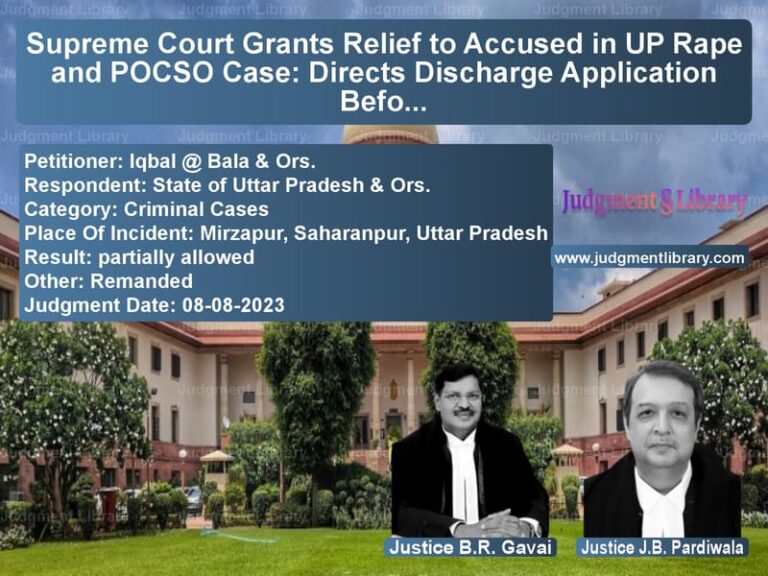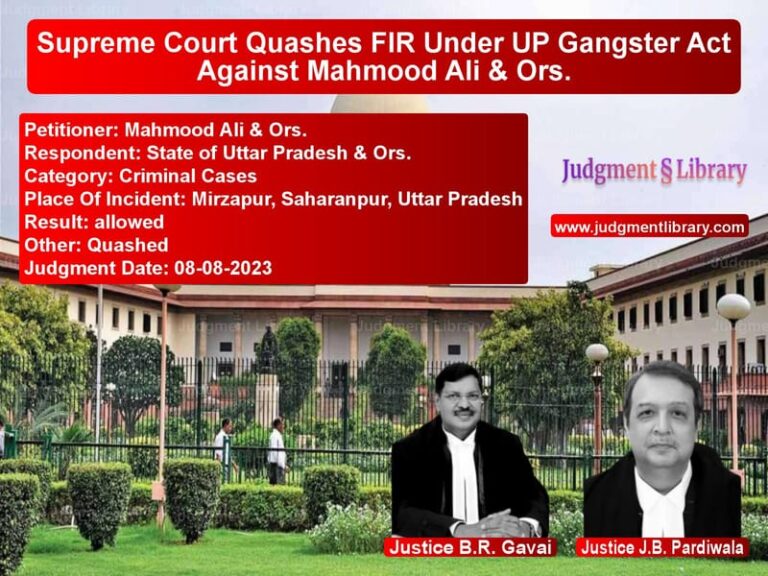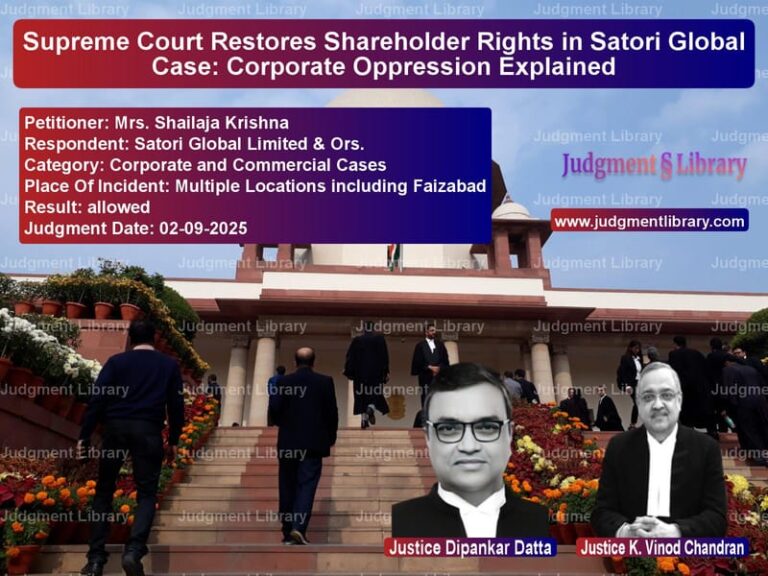Writ Petition in Gas Supply Tender Dispute: Supreme Court Quashes High Court’s Directions on Contract Finalization
The Supreme Court of India, in the case of Vaibhavi Enterprise & Ors. vs. Nobel Cera Coat & Ors., addressed a dispute regarding the allocation of natural gas under a tender issued by the Oil and Natural Gas Corporation (ONGC). The case involved the original writ applicant, Nobel Cera Coat, and two other competing bidders, Vaibhavi Enterprise and Tanish Cerachem Private Limited. The Supreme Court’s decision focused on the procedural fairness and judicial discretion in the tender process and whether the High Court’s intervention was justified in modifying the terms of the contract award.
Background of the Case
The dispute arose after ONGC invited expressions of interest (EOI) on July 22, 2020 for demand assessment for natural gas produced from two fields. The EOI outlined that gas supply would operate for five years from the date of award. Three applicants showed interest in sourcing the gas, with Nobel Cera Coat, Vaibhavi Enterprise, and Tanish Cerachem submitting their offers. A revision in Tanish Cerachem’s offer later introduced a 65-day window for lifting gas from the fields, which prompted ONGC to re-invite bids from all three applicants.
Despite Tanish Cerachem’s revised offer, Nobel Cera Coat did not submit a fresh bid, leading to the invocation of a writ petition before the Gujarat High Court. Nobel Cera Coat sought to challenge the re-invitation of bids, arguing that the modifications made by ONGC were unjustified.
Arguments Before the High Court
In its writ petition, Nobel Cera Coat challenged the ONGC letter dated March 8, 2021, which had called for a new period of readiness to off-take gas. The writ petitioner argued that the re-invitation of bids was unnecessary as its initial offer, which included a 75-day lifting period, was sufficient. The writ applicant also requested that ONGC finalize the contract with them based on the original bid.
High Court’s Intervention
The Gujarat High Court, while considering the writ petition, allowed Nobel Cera Coat’s request to revise its offer and reduced the gas lifting period from 75 days to 65 days. This modification led to a mandate from the High Court directing ONGC to finalize the gas supply contract with the writ applicant under the new terms.
The appellants (Vaibhavi Enterprise and Tanish Cerachem) contested the High Court’s decision, asserting that the judgment was made without giving them an opportunity to be heard. Moreover, the revision of the offer by Nobel Cera Coat was not properly examined by the High Court, and they were not made parties to the writ petition.
Arguments of the Appellants
Appellants’ (Vaibhavi Enterprise and Tanish Cerachem) Arguments:
- The writ petition was disposed of ex-parte, without giving the appellants an opportunity to present their case.
- They were not impleaded as necessary parties to the writ petition, violating their right to be heard.
- The modification of the offer by Nobel Cera Coat to lift the gas within 65 days instead of 75 days should have been properly scrutinized, and they should have been allowed to revise their own bids accordingly.
- The High Court’s intervention went beyond its jurisdiction, and its decision to allow Nobel Cera Coat’s revision of the bid without giving other applicants the same opportunity was unfair and unjust.
Respondent’s (Nobel Cera Coat) Arguments:
- The High Court’s decision was based on a valid exercise of judicial discretion to allow a modification in the offer, as the applicants were allowed to submit fresh bids.
- Since the offer modification was made during the pendency of the writ petition, there was no need for other applicants to be impleaded as parties to the case.
- The respondents had shown their willingness to comply with the new terms and expedite the gas off-take process, hence the direction to finalize the contract with them was reasonable.
Supreme Court’s Ruling
The Supreme Court quashed the High Court’s intervention, ruling that the procedure adopted by the High Court was unsustainable and violated principles of fairness. The key points of the judgment were:
On Judicial Overreach and Due Process:
The Court emphasized that the High Court’s decision to permit a modification of Nobel Cera Coat’s offer was not in accordance with the law, as it did so without providing the other applicants with an opportunity to be heard:
“In a tendering process, when a party revises its offer, all interested parties must be given an equal opportunity to modify their offers. The failure to implead the appellants as parties to the writ petition resulted in the violation of their fundamental right to fair hearing.”
On the Issue of Finalization of the Contract:
The Court noted that ONGC should finalize the contract based on a fair and transparent process, in which all bidders have an equal chance to submit revised bids:
“The modification of the offer by one party during the pendency of the writ petition should not be allowed unless other parties are given the same opportunity to amend their offers. The ONGC should reinitiate the bidding process or ensure a fair approach to finalize the contract.”
On the Role of the High Court in Tendering Cases:
The Court concluded that the High Court had overstepped its role in directing ONGC to finalize the contract with Nobel Cera Coat under revised terms. The Court stressed that such decisions should be left to the administrative and regulatory bodies:
“Judicial intervention in commercial or tendering matters must be limited to ensuring fairness and transparency. The Court should not dictate terms of the contract but ensure that the legal process is followed correctly.”
Impact of the Judgment
This judgment has several important implications for the tender process and the role of courts in adjudicating matters of commercial contracts:
- The judgment underscores the importance of procedural fairness in commercial disputes, ensuring that all parties have an equal opportunity to participate in a process.
- The ruling limits judicial intervention in commercial contracts and reaffirms that courts should not intervene in contractual terms unless necessary for ensuring fairness and transparency.
- It also highlights the need for parties to be properly impleaded in writ petitions, ensuring they have an opportunity to be heard before any orders are passed that may affect their interests.
Conclusion
The Supreme Court’s decision in Vaibhavi Enterprise vs. Nobel Cera Coat serves as a vital precedent for the adjudication of commercial disputes and the role of courts in maintaining fairness in tendering processes. The judgment ensures that no party is unfairly favored, and all applicants are given equal opportunities to present their bids in a transparent manner. It also reaffirms the principle that judicial oversight should be limited in commercial contract matters to avoid overreach, ensuring that administrative bodies like ONGC act in accordance with fair and transparent procedures.
Petitioner Name: Vaibhavi Enterprise & Ors..Respondent Name: Nobel Cera Coat & Ors..Judgment By: Justice M.R. Shah, Justice A.S. Bopanna.Place Of Incident: Gujarat.Judgment Date: 21-10-2021.
Don’t miss out on the full details! Download the complete judgment in PDF format below and gain valuable insights instantly!
Download Judgment: vaibhavi-enterprise-vs-nobel-cera-coat-&-or-supreme-court-of-india-judgment-dated-21-10-2021.pdf
Directly Download Judgment: Directly download this Judgment
See all petitions in Company Law
See all petitions in Corporate Governance
See all petitions in unfair trade practices
See all petitions in Judgment by Mukeshkumar Rasikbhai Shah
See all petitions in Judgment by A. S. Bopanna
See all petitions in allowed
See all petitions in Quashed
See all petitions in supreme court of India judgments October 2021
See all petitions in 2021 judgments
See all posts in Corporate and Commercial Cases Category
See all allowed petitions in Corporate and Commercial Cases Category
See all Dismissed petitions in Corporate and Commercial Cases Category
See all partially allowed petitions in Corporate and Commercial Cases Category







